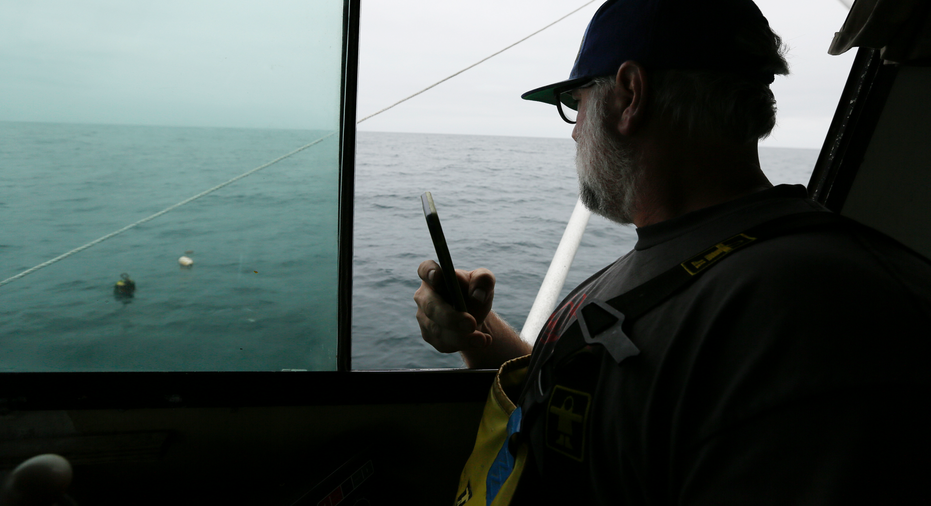California crabbers use GPS to find whale-killing gear

HALF MOON BAY, Calif. – Fisherman Jake Bunch leans over the side of the fishing boat "Sadie K," spears his catch, and reels it aboard: an abandoned crab pot, dangling one limp lasagna noodle of kelp and dozens of feet of rope, just the kind of fishing gear that has been snaring an increasing number of whales off U.S. coasts.
Confirmed counts of humpbacks, blue and other endangered or threatened species of whale entangled by the ropes, buoys and anchors of fishing gear hit a record 50 on the East Coast last year, and tied the record on the West Coast at 48, according to the National Oceanic and Atmospheric Administration. The accidental entanglements can gouge whales' flesh and mouth, weaken the animals, drown them, or kill them painfully, over months.
This year, Bunch is one of small number of commercial fishermen out of Half Moon Bay, south of San Francisco, and five other ports up and down California who headed to sea again after the West Coast's Dungeness crab season ended this summer.
The California fishermen are part of a new effort using their cellphones' GPS and new software pinpointing areas where lost or abandoned crabbing gear has been spotted. They retrieve the gear for a payment — at Half Moon Bay, it's $65 per pot —before the fishing ropes can snag a whale.
Especially stormy weather this year has meant more wayward crabbing gear than usual, Bunch said recently on a gray late-summer morning at sea.
"Makes it all the more important to pick it up," he says.
Bunch spots the algae-blackened buoy of his first derelict crab pot of the day just after a humpback surfaces near the Sadie K.
Leaning out the window of his boat's cabin, Bunch uses his phone to snap a picture of the spot, capturing its location via the GPS setting. Then he hauls in the crab pot, the size and shape of a giant truck tire, and removes the owner's tag inside that California mandates. He tosses the lone live crab inside the pot back into the water — it's the offseason.
The crab gear goes back to Bunch's port, which charges the original owners $100 for returning the lost gear — a bargain, compared to the $250 a new pot costs.
California fishermen and port officials working with the Nature Conservancy environmental group developed the program, designed to be affordable and easy enough for ports to manage on their own.
West Coast fishermen annually lose thousands of pots for Dungeness crabs, which are a staple of Thanksgiving dinners and community crab feeds across California.
Dungeness bring in tens of millions of dollars in revenue in a good year. But they also are the single-largest identifiable source of fishing gear entangling whales on the West Coast. Crab pots and the lines can get carried away by waves or by vessels that accidentally snag them. Sometimes fishermen abandon their pots or lose them.
On the East Coast, meanwhile, lobster traps and gillnets are among the culprits in whale entanglements.
On both coasts, fishermen and others regularly join missions to cut free whales found tangled in gear. Last July, a Canadian fisherman was killed while rescuing an Atlantic right whale snagged by lines.
Clearly, "taking gear off the whales is not the solution to the problem. At all," said Justin Viezbicke, who tracks West Coast entanglements for NOAA federal fisheries. The answer is "prevent these things from happening in the future."
Off the West Coast, changes in ocean temperatures in recent years mean fishermen and whales increasingly have found themselves in the same waters.
The surge in whale entanglements has fueled tensions in California between commercial fishing operators eager to show they are trying to tackle the problems and some conservationists.
Some environmental groups say the state should put in place more mandatory protection measures, such as blocking fishermen from especially important waters for whales.
One group, the Center for Biological Diversity, filed notice this summer that it plans to sue California for allegedly not doing enough to keep the Dungeness crab fishery from killing protected whale species.
"We've been hearing for years now from both the state of California and fishermen that they care about the problem and want to address it," said Kristen Monsell, a staff attorney for the Center for Biological Diversity.
"But nothing has changed other than more whales are getting tangled off our coast and dying painful, tragic deaths," Monsell said.
On this morning, Bunch quickly reels in nine derelict crab pots in fewer than two hours.
Back at Half Moon Bay port, Lisa Damrosch, executive director of the local seafood marketing association, has taken in about 450 recovered crab pots so far this year, stacking them behind a fence to return them to their owners before the crucial holiday season for Dungeness crab.
"No one wants to entangle a single whale," Damrosch said. But "the best fishermen in the world are going to lose a pot."



















